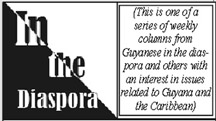 While other politicians glossed over the island’s problems, Trump lays colonialism’s cruelty bare.
While other politicians glossed over the island’s problems, Trump lays colonialism’s cruelty bare.
Yarimar Bonilla is a founder of the Puerto Rico Syllabus project. She is professor of anthropology and Caribbean studies at Rutgers University and a 2018-19 Carnegie Fellow.
Editor’s Note: This article first appeared as “Trump’s false claims about Puerto Rico are insulting. But they reveal a deeper truth,” in the Washington Post, September 14, 2018.
Puerto Ricans woke up last Thursday, a mere week before the anniversary of Hurricane Maria, to a new storm. Once again, U.S. President Donald Trump had minimized the tragedy on the island, suggesting on Twitter that the multiple scientific studies regarding the death count in Puerto Rico were really the product of political interests seeking to tarnish his recovery efforts. His tweets were received with shock and horror across both Puerto Rico and the mainland United States with many asking themselves: What kind of cruelty does it take to portray death and disaster as “fake news?”
Taken at face value, Trump’s claims are absurd. The death toll in Puerto Rico was not due to simple wind and rain, but to infrastructural failures that the Federal Emergency Management Agency (FEMA) has already admitted. Mass casualties are not, as House Speaker Paul Ryan claimed in Trump’s defence last Thursday, simply a thing that happens—they are the product of structural failure and imperial neglect.
Puerto Ricans died due to lack of access to health care and medication. They died from sleep apnea, untreated heart and liver disease and bacterial diseases caught while trying to clear roads or find sources of water. These deaths are tragic precisely because they were preventable. They were not a product of angry storm waters but of a neglectful government that failed to protect and care for its citizens. This is the tragedy, this is the cruelty. Trump simply added another insult.
Yet his insistence on maligning Puerto Rico and its people might have an unintended positive outcome: to cast a spotlight on Puerto Rico’s longstanding problems. Previous administrations have been just as neglectful in their policy towards the island, but they’ve done so in ways that silenced or glossed over Puerto Rico’s relationship to the United States.
Trump, on the other hand, lays it bare.
Former president Barack Obama visited the island in 2011 and warmed hearts by dancing salsa and eating local delicacies. Many were hopeful that an African American president would take seriously the structural inequalities and politics of exclusion that shape U.S. territorial relations. But when it came time to deal with the island’s debt crisis, he only worsened the disparities. The same president who led bailouts for banks and car companies closed the door on using the Federal Reserve to restructure Puerto Rico’s debt, as many had recommended. Instead, he passed the buck to Congress which imposed a fiscal-control board that costs Puerto Ricans over two million dollars a month, and whose sole focus is on cutting services, pensions and wages, while raising taxes and the cost of living. It was precisely these policies which placed the island on the path of disaster to begin with.
Trump has remarked that Puerto Rico’s power company was already “dead” before the storm. This is false, but it reveals a truth: The power company was undergoing economic restructuring which had led to disinvestments, layoffs and lack of inventory — all of which contributed to residents spending nearly a year in the dark. These very same policies are now being extended by the Obama-appointed fiscal board in the wake of the storm.
Trump might be the only president to overtly assert that Puerto Rican deaths don’t matter, that they don’t need to be counted. But he is certainly not the only politician in Washington who feels that Puerto Rican lives, and those of the other U.S. territories, matter less than those in the mainland. On both sides of the aisle, politicians in Washington have repeatedly voted against granting the island parity when it comes to health care, wages, disability benefits, or even veterans’ rights.
Despite this long history of disparity and inequality, it has really only been under the Trump administration that Puerto Rico’s colonial status has made headlines — and even then barely so. Studies have shown that media coverage of Hurricane Maria paled in comparison to that of Harvey which impacted the mainland United States. It was only when Trump picked a fight with the San Juan mayor that attention shifted towards Puerto Rico. More U.S. citizens died as a result of Hurricane Maria than as a result of either Hurricane Katrina or 9/11. Yet it is only when Trump shows his disdain towards Puerto Rico’s tragedy that the island becomes a part of the national consciousness. Its usual absence is the larger truth that his tweets reveal.
Puerto Rico’s disaster does not begin or end with Trump’s disregard. It is a product of over a century of colonial policy which has led to a distorted economy built for the benefit of the few, corruption that has lined pockets from San Juan to Montana and everywhere in between, and a crisis of migration and displacement which has, in turn, fueled a crisis of imagination.
Trump’s tweets were just another sign of disrespect from the United States for its Caribbean colony. But whether he meant to or not, he still managed to reveal some otherwise hidden truths.

